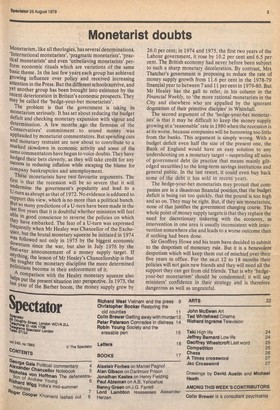Monetarist doubts
Monetarism, like all theologies, has several denominations. 'International monetarists', 'pragmatic monetarists', 'prac tical monetarists' and even 'unbelieving monetarists' per form economic rituals which are variations of the same basic theme. In the last few years each group has achieved growing influence over policy and received increasing attention in the Press. But the different schools survive, and Yet another group has been brought into existence by the recent deterioration in Britain's economic prospects. They May be called the 'hedge-your-bet monetarists'. The problem is that the government is taking its monetarism seriously. It has set about reducing the budget deficit and checking monetary expansion with vigour and determination. A few months ago the firmness of the Conservatives' commitment to sound money Was applauded by monetarist commentators. But spending cuts and monetary restraint are now about to contribute to a marked slowdown in economic activity and some of the same commentators have begun to voice doubts. They have hedged their bets cleverly, as they will take credit for any success in reducing inflation while escaping the blame for company bankruptcies and unemployment. These monetarists have two favourite arguments. The first is that the recession will be so severe that it will undermine the government's popularity and lead to a 11-1-turn as abrupt as that of 1972. No evidence is adduced to suPport this view, which is no more than a political hunch. But so many predictions of a U-turn have been made in the last five years that it is doubtful whether ministers will feel able in good conscience to reverse the policies on which tfhey have embarked. The fear of a U-turn was expressed requently when Mr Healey was Chancellor of the Exchequer, but the brutal monetary squeeze he initiated in 1974 Was followed not only in 1975 by the biggest economic 0..ownturn since the war, but also in July 1976 by the nrst-ever announcement of a money supply target. If !nything, the lesson of Mr Healey's Chancellorship is that Ille.t9tigher the monetary discipline the more determined Pointeians become in their enforcement of it, comparison with the Healey monetary squeeze also s put the present situation into perspective. In 1973, the Last Year of the Barber boom, the money supply grew by 26.0 per cent; in 1974 and 1975, the first two years of the Labour government, it rose by 10.2 per cent and 6.5 per cent. The British economy had never before been subject to such a sharp monetary deceleration. By contrast, Mrs Thatcher's government is proposing to reduce the rate of money supply growth from 11.6 per cent in the 1978-79 financial year to between 7 and 11 per cent in 1979-80. But Mr Healey has the gall to refer, in his column in the Financial Weekly, to 'the more rational monetarists in the City and elsewhere who are appalled by the ignorant dogmatism of their primitive disciples' in Whitehall.
The second argument of the 'hedge-your-bet monetar ists' is that it may be difficult to keep the money supply growing at a 'reasonable' rate in 1980 when the recession is at its worse, because companies will be borrowing too little from the banks. This argument is simply wrong. With a budget deficit even half the size of the present one, the Bank of England would have an easy solution to any undershooting on a monetary target — suspending all sales of government debt (in practice that means mainly gilt edged securities) to the long-term savings institutions and general public. In the last resort, it could even buy back some of the debt it has sold in recent years.
The hedge-your-bet monetarists may protest that companies are in a disastrous financial position,that the budget deficit is being cut too quickly, that the pound is too high and so on. They may be right. But, if they are monetarists, none of that justifies the government changing course. The whole point of money supply targets is that they replace the need for discretionary tinkering with the economy, as intervention in one area is usually inconsistent with intervention somewhere else and leads to a worse outcome than if nothing had been done.
Sir Geoffrey Howe and his team have decided to submit to the despotism of monetary rule. But it is a benevolent despotism which will keep them out of mischief over their five years in office. For the neAt 12 to 18 months their policies will not gain new friends and they will need all the support they can get from old friends. That is why 'hedgeyour-bet monetarism' should be condemned; it will sap ministers' confidence in their strategy and is therefore dangerous as well as ungrateful.






























 Previous page
Previous page